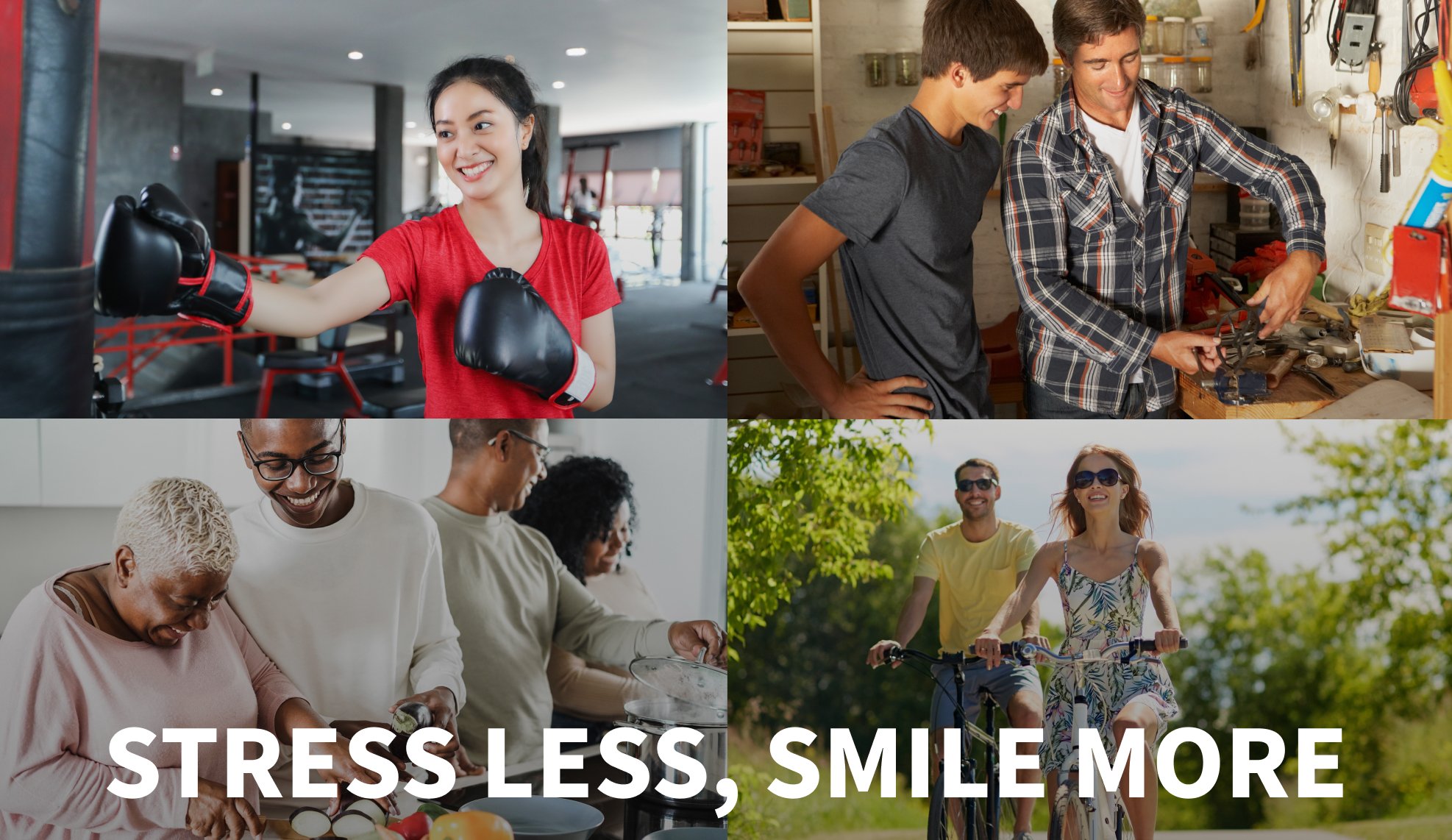Even with its rewarding moments, dentistry is a remarkably stressful, demanding profession. Between high-pressure clinical environments, long hours, staffing issues, patient anxiety, and over-booked schedules, dental professionals are juggling any number of challenges at any given time. This can often lead to burnout and negatively impact mental health.
A recent study on burnout in dental professionals found the issue to be widespread throughout the industry, affecting oral care providers across the world. The same study says the COVID pandemic amplified many of the factors leading to burnout.1
With the mountain of stresses present in the profession, it’s important for oral care providers to prioritize their mental health.
Any number of self-help books will tell you “Establishing clear boundaries and encouraging open communication” are the keys to minimizing stress in the workplace. Sure, taking those steps will certainly help.
But what do real-world people working in dental offices do to take care of themselves? How do those people actually manage their stress and mitigate burnout? We spoke to members of Ultradent’s in-house clinical team to see what they do to invest in their mental well-being; ranging from drinking wine and cooking to downhill mountain biking, they’ve all found ways to keep themselves from reaching burnout.
Family Time
Healthy relationships with family and friends can have a significant positive impact on mental wellness.2 For Dr. James Wright, DDS, clinical advisor for Ultradent, spending time with loved ones is the best way he has found to manage his professional stress. “At times it can be hard to leave work at work, but making and spending quality time with family gives us a sense of belonging,” he says, noting that close friends belong in the conversation as well. “Simple walks, sharing a meal together, a bike ride, playing games, and engaging in conversation help reduce anxiety and strengthen those most important relationships.”
.00_00_02_15.Still001.jpg?width=576&height=1024&name=Image%20(34).00_00_02_15.Still001.jpg)
Dr. Miotto Palo with his children while preparing a meal.
Carving out time for friends and family is also how Ultradent clinical advisor Dr. Renato Miotto Palo, DDS, recharges his batteries. He uses his passion for culinary exploration to connect with people and share quality time. “I decompress by gathering friends, drinking, and eating together,” he says. “I love to cook for people I love.” Having the creative outlet of being the resident chef for his family gives Dr. Palo something to take his mind off the daily stresses that mount on dental professionals. He doesn’t use a lot of recipes, instead choosing to let the ingredients on-hand direct him. “I make some mistakes, but that’s OK. When you have friends and good drinks, it all usually works out.”
Physical Health for Mental Health
Dr. Mark Pettit, DDS, and fellow member of Ultradent’s clinical advisory team, gets his quality family time on two wheels, road cycling throughout Utah with his brother. “We ride just about every Saturday, we do about 40 miles,” he says. “We’ll go on our rides, we’ll be out for 2–3 hours, we’ll be talking about our kids, talking about work, talking politics. And when we’re done with our ride, we’ve had a chance to decompress and manage what we’re dealing with.”

Dr. Mark Pettit (right) with his brother during a road cycling trip in Utah.
Dr. Brigham Stoker, DDS, another member of Ultradent’s clinical team, similarly turns to biking, but for him, mountain biking offers a solitary escape. “Exercise in general is a good stress reliever, but for me personally, I need alone time without any noise,” says Dr. Stoker. “When I’m out mountain biking, it's one of the only times I’m not distracted by other things. I’m not thinking about other things, and I can just enjoy being outside and exercising.” For Dr. Stoker, carving out intentional time away from obligations is essential. “Sometimes you have to leave some things undone to go mountain biking. When I come back, I’m usually less stressed and more efficient.”
Routine and Mindfulness
“Drinking water, getting enough sleep, limiting sugars, and working out, especially kickboxing, really help clear my mind,” says hygienist and Ultradent clinical advisor for hygiene, Crystal Barnes.
.jpeg?width=487&height=649&name=Image%20(36).jpeg) Ultradent clinical advisor Crystal Barnes, RDH, teaching a fitness class near her home in Utah.
Ultradent clinical advisor Crystal Barnes, RDH, teaching a fitness class near her home in Utah.
She says mindfulness is a big part of her daily routine. “It’s easy to fall into negativity, especially with the emotional baggage that patients might bring into the office. To avoid absorbing these energies, I try to disconnect. Going outside, moving my body, or baking sourdough bread helps clear my head and resets my perspective.” Barnes finds outdoor activities, like hiking and paddle boarding, especially therapeutic, calling nature “the best medicine.”
Managing Expectations and Workload
As is common in the dental profession, Dr. Gary Findley, DDS, works with pretty tight schedules. He’s a practice owner, lecturer, manager of Ultradent’s clinical team, he spent several years as a dentist for the Utah Grizzlies hockey team, all on top of trying to spend as much time as he can with his wife and two children. Controlling his workload and managing expectations allow him to preemptively manage stress and mitigate burnout. “My biggest thing is watching my schedule. I enjoy the artistic aspect of restorative dentistry, but the stress comes when I'm forced to rush. It's important to work efficiently, but not under unnecessary pressure.” Dr. Findley also emphasizes the importance of incremental change to avoid stress. “I don’t like too many new things at once,” he says. “It’s about managing the amount of change you introduce. Gradual adjustments are key.”
.jpeg?width=4032&height=3024&name=Image%20(35).jpeg)
Dr. Findley (center) with Dr. Palo (foreground) and friends on an ATV ride in Utah; 2025.
Dr. Findley also emphasizes the importance of making weekends feel distinct from the rest of the workweek. “Weekends should punctuate your week with something you genuinely enjoy that’s completely unrelated to work. Like ATV riding, boating, or even just wrenching on equipment in my garage. It provides a mental break.”
Finding Balance: Investing in Yourself for Long-Term Wellness
While dentistry can certainly be demanding, there are numerous effective strategies to manage stress and avoid burnout. Whether it's spending meaningful time with family and friends, relaxing through cooking, or biking until you’re exhausted, finding something that helps you recharge is critical to being a successful dentist. By finding balance and setting aside dedicated time for rejuvenation, you can sustainably navigate the pressures of profession while continuing to deliver exceptional care to your patients.
FAQs
- Why is dentistry considered such a stressful profession?
Dentistry involves high-pressure clinical environments, long hours, overbooked schedules, staffing challenges, and patients who often arrive with their own anxiety. These demands can contribute to stress, burnout, and mental health struggles for oral care providers.
- Did the COVID-19 pandemic make burnout worse for dental professionals?
Yes. Research shows the pandemic amplified many stressors in dentistry, leading to higher rates of burnout worldwide.
- What role does family and social connection play in reducing stress?
Spending time with loved ones can significantly boost mental wellness. Dr. James Wright finds that walks, meals, games, and conversations with family or close friends ease anxiety and strengthen relationships. Dr. Renato Miotto Palo decompresses through cooking and sharing meals with friends and family, using food as both a creative outlet and a way to connect.
- How can physical activity help manage stress in dentistry?
Exercise provides both social and solitary ways to relieve stress. Dr. Mark Pettit goes cycling with his brother most Saturdays, using the time to talk and decompress. Dr. Brigham Stoker prefers solo mountain biking, saying it helps him clear distractions, reset mentally, and return to work more efficient and less stressed.
- What role does routine and mindfulness play in mental well-being?
Daily habits like hydration, sleep, balanced nutrition, and exercise support mental health. Crystal Barnes, RDH, incorporates kickboxing, outdoor activities, and baking to reset her perspective. She emphasizes mindfulness and disconnecting from negativity, calling time in nature “the best medicine.”
- How can workload management help prevent burnout?
Dr. Gary Findley stresses the importance of controlling schedules to avoid unnecessary rushing. He advocates for efficiency without pressure, gradual change instead of too much at once, and keeping weekends distinct with enjoyable, non-work activities like ATV riding or boating.
References
- Negucioiu M, Buduru S, Ghiz S, et al. Prevalence and Management of Burnout Among Dental Professionals Before, During, and After the COVID-19 Pandemic: A Systematic Review. Healthcare (Basel). 2024;12(23):2366. Published 2024 Nov 26. doi:10.3390/healthcare12232366
- Thomas PA, Liu H, Umberson D. Family Relationships and Well-Being. Innov Aging. 2017;1(3):igx025. doi:10.1093/geroni/igx025








